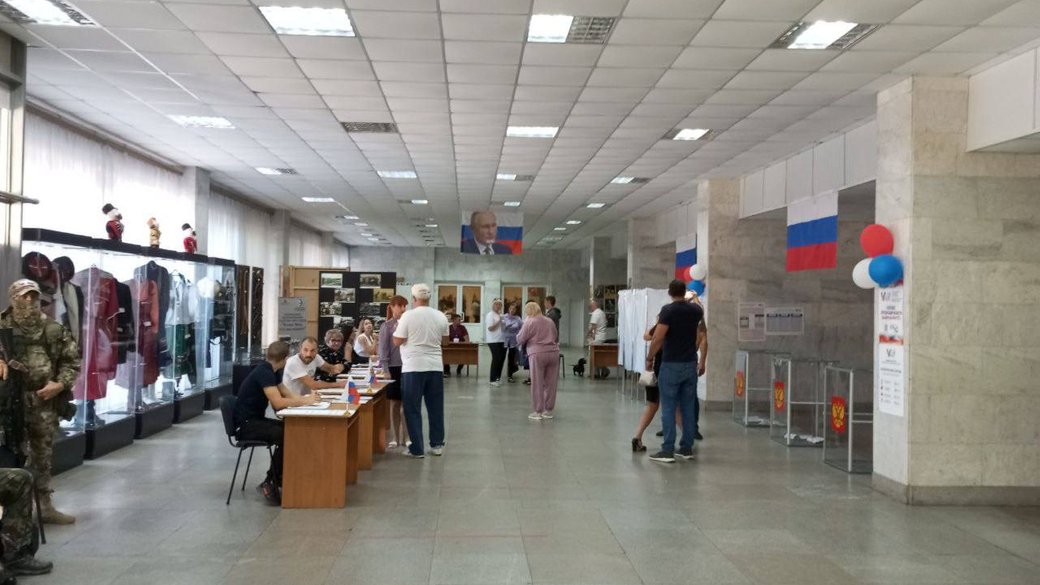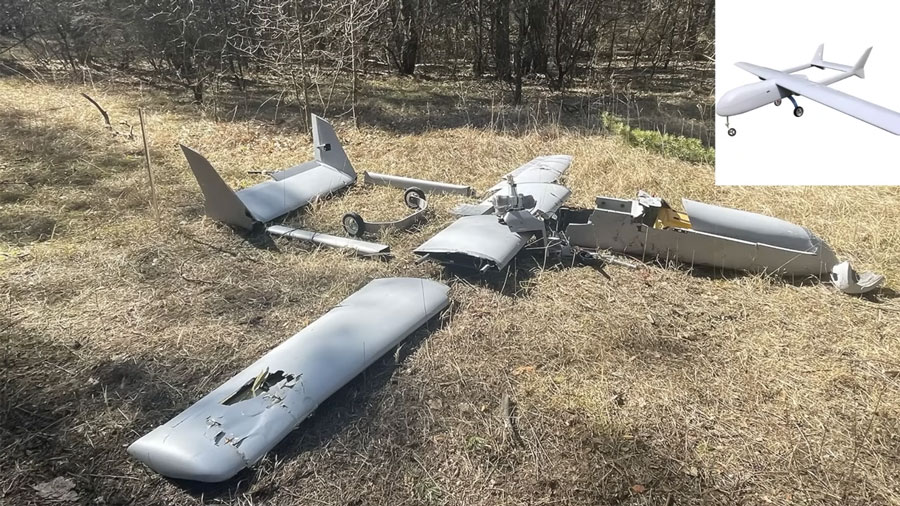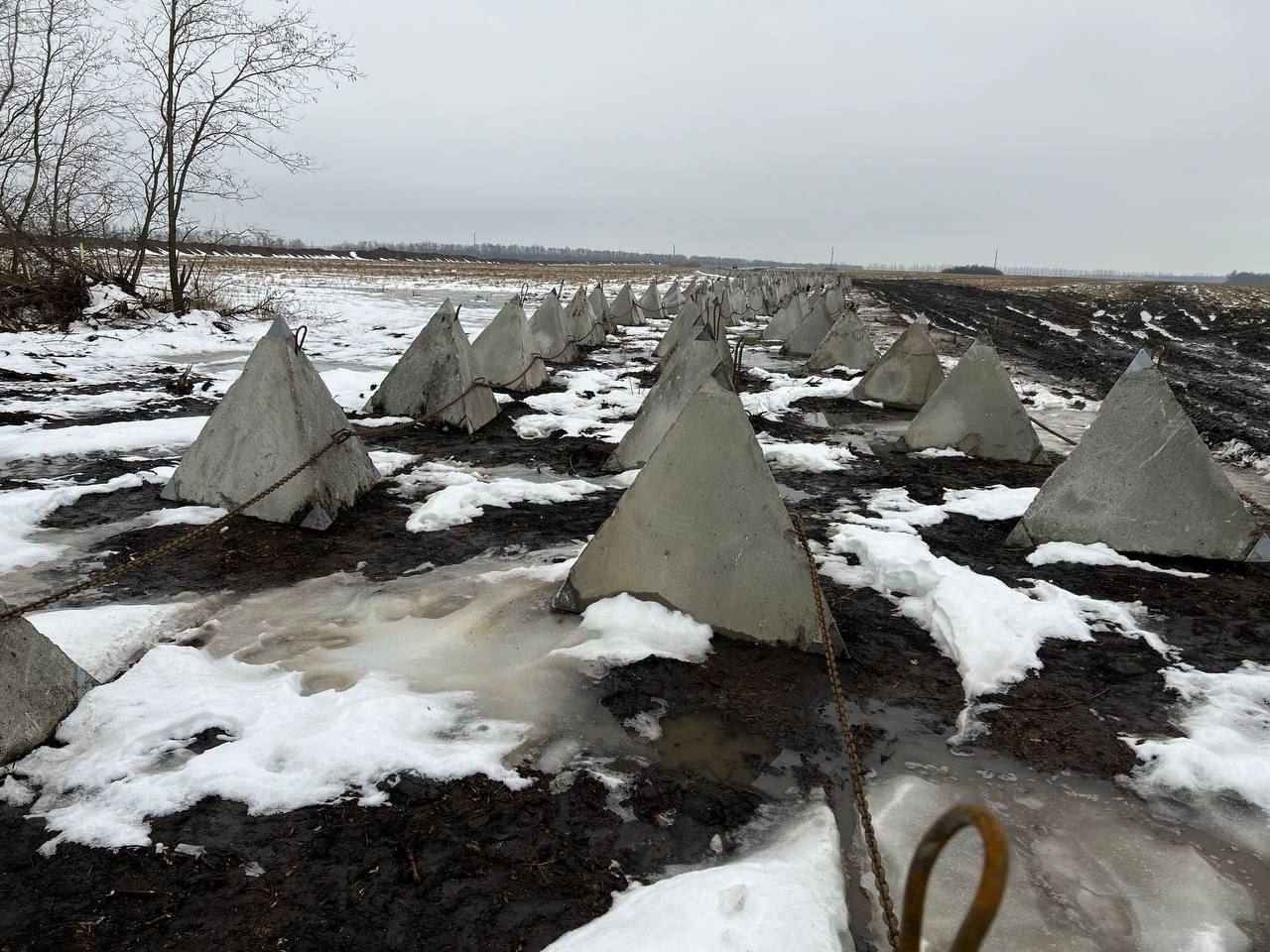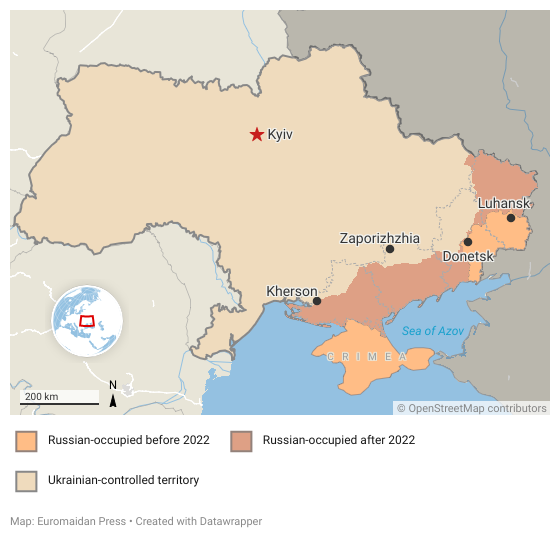 The “elections” were held on 8-10 September, despite the international community widely dismissing them as a sham. These were so-called “regional elections” to determine the composition of local Russian-installed authorities, including puppet parliaments, local councils, and governors.
The “elections” were held on 8-10 September, despite the international community widely dismissing them as a sham. These were so-called “regional elections” to determine the composition of local Russian-installed authorities, including puppet parliaments, local councils, and governors.
Predetermined results for “United Russia” and political integration of occupied territories
The results were predictable: Russia claimed that Putin's party, United Russia, won everywhere by a large margin. For instance, in the occupied part of the Zaporizhzhia Oblast, it was claimed to receive 83%. It purportedly garnered around 75% of the vote in other occupied regions. All the governors appointed by Russia also remain in their positions. Nobody doubted that these figures would be precisely like this. The United Kingdom’s representative at the UN, Barbara Woodward, stated that Russia knew the results in advance.“Not only are Russia’s actions illegal and illegitimate, but we have information that the Kremlin has pre-determined the results of the sham elections across sovereign Ukrainian territory which Russia temporarily controls,” Woodward said.In Russia itself, Putin’s United Russia has a rich history of falsifying elections. The process of rigging the vote is regularly analyzed by Russian statisticians, who publish the coefficient of fraud after each “election” in Russia. Therefore, the “voting” in Ukraine by definition could not be democratic; nor did it have a semblance of legality, according to the head of the board of the Civic Network OPORA, Olha Aivazovska. She maintains that the Russians are pursuing only one goal - to politically integrate the occupied territories into the legal space of the Russian Federation, according to their legislation.
"It is insufficient to nominally include the territory in the constitution of the Russian Federation, one needs to include it in the political process, which does not fully exist in Russia, where democracy was abolished long ago. We understand that there can be neither a high turnout nor real expression of will there. But the small number of [Ukrainian] citizens who will organize this process will not be able to take a step back. According to Ukrainian law, organizing illegal elections and referendums is a crime," Aivazovska said, referring to the collaborators in the occupied territories of Ukraine.
Armed commissions go door-to-door, probing for men to mobilize
According to locals, the “vote” had nothing to do with regular elections. Initially, Russian officials went door-to-door with ballot boxes, and only after that they summoned residents to “polling stations.” “Voting' could be done with either Russian or Ukrainian passports. Photos show people dropping ballots into boxes under the watchful eyes of heavily-armed soldiers."People living in the occupied territory say that collaborators together with the Russian military are going around with ballot boxes and demanding to vote for United Russia, even though there are several parties on the ballot. Before the ‘election,’ in some villages, they took away people's passports and phones and said they would return them when the [ballots were checked]. They walked around with machine guns and recorded the voting on camera. This is what happened in Kherson during the referendum," Oksana Pohomiy, a Ukrainian lawmaker from Kherson Oblast, told Suspilne of the vote in her occupied region.The occupation authorities claim that the voter turnout was very high. For example, in the occupied part of the Kherson Oblast, according to the Russians, 65.1% of residents came to “vote.”
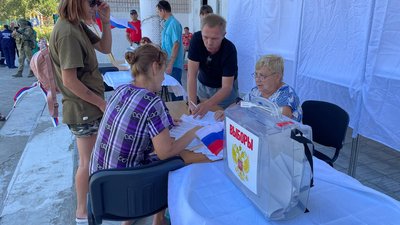
"Members of the ‘election committees’ go door-to-door with automatic weapons and show people where to mark their ballots. They force municipal employees to simultaneously come to a single polling station to capture a 'large number of voters' on camera and show it to the Kremlin," Fedorov stated.Yuriy Konovalenko, the legitimate head of occupied Polohy, echoes this observation, telling Suspilne that two soldiers with machine guns and several collaborators from the “electoral commission” had gone around the city and nearby villages with ballot boxes. “In some places, they were more active; in others, they knocked on the door and left. They didn't ask for passports at all; they had lists of who lived there. They gave a ballot and demanded to vote," Konovalenko stated. According to Ukrainian Army spokeswoman Nataliia Humeniuk, the commissions going around the settlements because the turnout at polling stations was a flop.
“The Russian occupiers are trying to collect the votes of the electorate as much as possible to understand how many people live on this territory in general, and what mobilization resources they can count on. They are trying to create so-called 'territorial defence units' out of them, under the pretext of defending their locality, but then reformat them into groups that are sent to the front line," Humeniuk said.
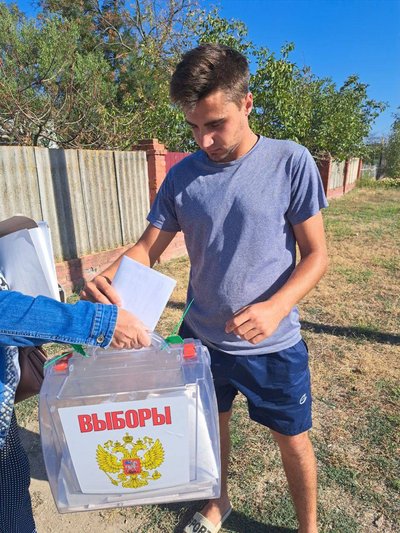
Kremlin-approved international "observers"
The Russians have brought propagandists and “pseudoexperts” from all over the world to legitimize the fake elections, the Kyiv-based Institute for Mass Information (IMI) reports. These individuals do not even pretend to belong to any independent international organization, IMI writes. Moscow openly bought all of them, and they are not ashamed. For example, the Russians brought seven propagandists from India, Brazil, Spain, Iceland, the Netherlands, and Mozambique to the occupied part of Kherson Oblast, a photo of the “delegation” shows.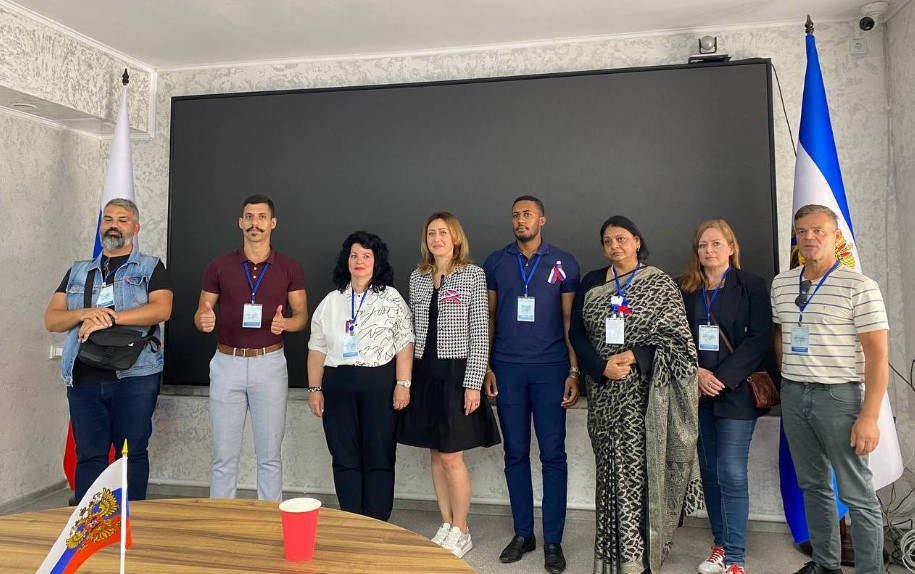
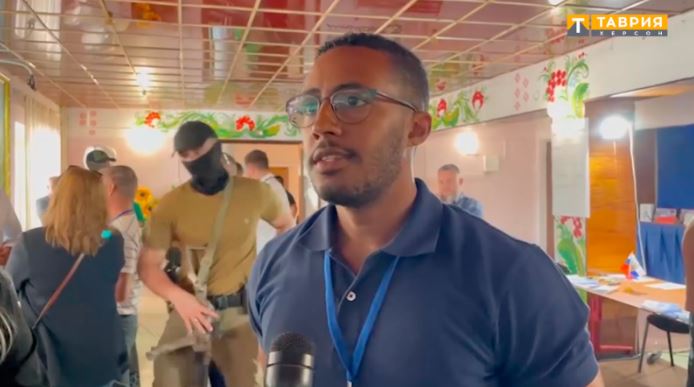
Candidates include Russian soldiers, collaborators wanted for treason in Ukraine
Russia’s central elections committee has not made public the lists of candidates for the local “parliaments” in Russian-occupied Ukraine “for security reasons.” However, some candidates showed up in the media in the pre-electoral period. Among them is Dmytro Tabachnyk, former head of the Presidential Administration of Ukraine’s pro-Russian fugitive ex-president Yanukovych, wanted for treason in Ukraine. Also among them is Viktor Zubrytskyi, founder of the notorious pro-Russian 112 channel, an outlet linked to “Putin’s compadre” Viktor Medvedchuk that spread conspiracies and disinformation before Russia’s full-scale invasion. Both indicated in their data that they were "advisers" to the "head of the administration" of Zaporizhzhia Oblast. The Ukrainian Parliament Commissioner for Human Rights Dmytro Lubinets explained that the candidates included individuals who should not be on the ballot but rather in prison.“According to media reports, among the candidates for representative bodies are Russian military personnel who participated in the invasion of Ukraine, killed and tortured people,” Lubinets said.Ukraine’s Security Service identified over 3,500 organizers and participants of the fake "elections" in Russian-occupied territories, and have pressed charges based on all the gathered facts, specifically under two counts: “violation of Ukraine's territorial integrity” and “collusion." Previously, Ombudsman Lubinets stressed that Russian-installed administrations in the occupied territories of Ukraine force Ukrainian citizens to apply for Russian citizenship, take Russian passports, and vote in sham elections.
Ukraine’s Ombudsman: Ukrainian citizens forced to apply for Russian passports and vote in sham electionsRussia has applied this strategy earlier to other parts of occupied Ukraine. Prior to the full-scale invasion of 2022, residents of occupied Donbas were also pressured to accept Russian passports and then shuttled into mainland Russia to participate in Duma elections after a period of campaigning by United Russia.
International community slams the “voting”
The international community does not recognize “voting” in the occupied territories of Ukraine. The US labeled it as “pseudo-elections” and said they would never recognize the results.“The Kremlin hopes these pre-determined, fabricated results will strengthen Russia's illegitimate claims to the parts of Ukraine it occupies, but this is nothing more than a propaganda exercise. We remind any individuals who may support Russia's sham elections in Ukraine, including by acting as so-called 'international observers,' that they may be subject to sanctions," the US State Department noted.The European Commission and the Council of Europe have condemned these “elections.” Ukrainian authorities have stated that the “voting” in the occupied territories is worthless and has no legal force.
"You can't hold 'elections' in someone else's country," the Ukrainian Ministry of Foreign Affairs said.The Ukrainian MFA also warned that the organizers, both Russian officials and collaborators, will be held accountable.

